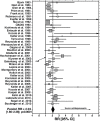Prevention of Relapse and Recurrence in Adults with Major Depressive Disorder: Systematic Review and Meta-Analyses of Controlled Trials
- PMID: 26152228
- PMCID: PMC4772815
- DOI: 10.1093/ijnp/pyv076
Prevention of Relapse and Recurrence in Adults with Major Depressive Disorder: Systematic Review and Meta-Analyses of Controlled Trials
Erratum in
-
Erratum.Int J Neuropsychopharmacol. 2016 Apr 27;19(10):pyw031. doi: 10.1093/ijnp/pyw031. Int J Neuropsychopharmacol. 2016. PMID: 27207904 Free PMC article. No abstract available.
Abstract
Background: Findings of substantial remaining morbidity in treated major depressive disorder (MDD) led us to review controlled trials of treatments aimed at preventing early relapses or later recurrences in adults diagnosed with MDD to summarize available data and to guide further research.
Methods: Reports (n = 97) were identified through systematic, computerized literature searching up to February 2015. Treatment versus control outcomes were summarized by random-effects meta-analyses.
Results: In 45 reports of 72 trials (n = 14 450 subjects) lasting 33.4 weeks, antidepressants were more effective than placebos in preventing relapses (response rates [RR] = 1.90, confidence interval [CI]: 1.73-2.08; NNT = 4.4; p < 0.0001). In 35 reports of 37 trials (n = 7253) lasting 27.0 months, antidepressants were effective in preventing recurrences (RR = 2.03, CI 1.80-2.28; NNT = 3.8; p < 0.0001), with minor differences among drug types. In 17 reports of 22 trials (n = 1 969) lasting 23.7 months, psychosocial interventions yielded inconsistent or inconclusive results.
Conclusions: Despite evidence of the efficacy of drug treatment compared to placebos or other controls, the findings further underscore the substantial, unresolved morbidity in treated MDD patients and strongly encourage further evaluations of specific, improved individual and combination therapies (pharmacological and psychological) conducted over longer times, as well as identifying clinical predictors of positive or unfavorable responses and of intolerability of long-term treatments in MDD.
Keywords: Antidepressants; depression; major depression; psychotherapy; recurrence; relapse.
© The Author 2015. Published by Oxford University Press on behalf of CINP.
Figures


References
-
- Alexopoulos GS, Meyers BS, Young RC, Kalayam B, Kakuma T, Gabrielle M, Sirey JA, Hull J. (2000) Executive dysfunction and long-term outcomes of geriatric depression. Arch Gen Psychiatry 57:285–290. - PubMed
-
- Amsterdam JD, Bodkin JA. (2006) Selegiline transdermal system in the prevention of relapse of major depressive disorder: 52-week, double-blind, placebo-substitution, parallel-group clinical trial. J Clin Psychopharmacol 26:579–586. - PubMed
-
- Baldessarini RJ. (2013) Chemotherapy in Psychiatry, 3rd edition. New York: Springer Press.
-
- Baldessarini RJ, Tondo L, Ghiani C, Lepri B. (2010) Illness risk following rapid versus gradual discontinuation of antidepressants. Am J Psych 167:934–941. - PubMed
-
- Baldessarini RJ, Lau WK, Sim J, Sum MY, Sim K. (2015) Duration of initial antidepressant treatment and subsequent relapse of major depression. J Clin Psychopharmacol 35:75–76. - PubMed
Publication types
MeSH terms
Substances
LinkOut - more resources
Full Text Sources
Other Literature Sources
Molecular Biology Databases

